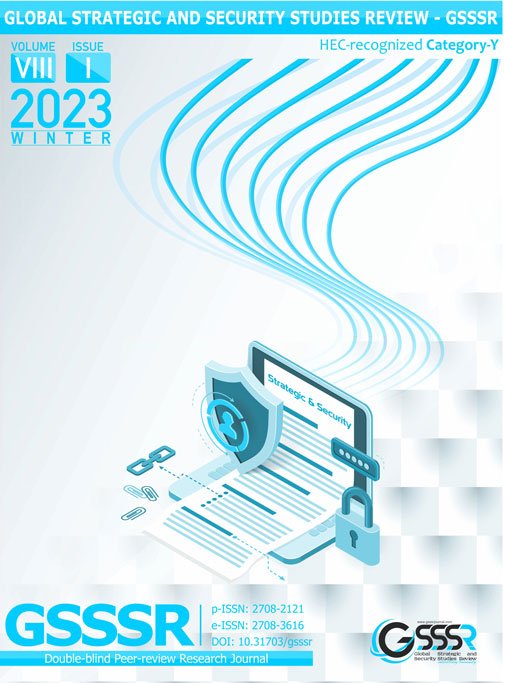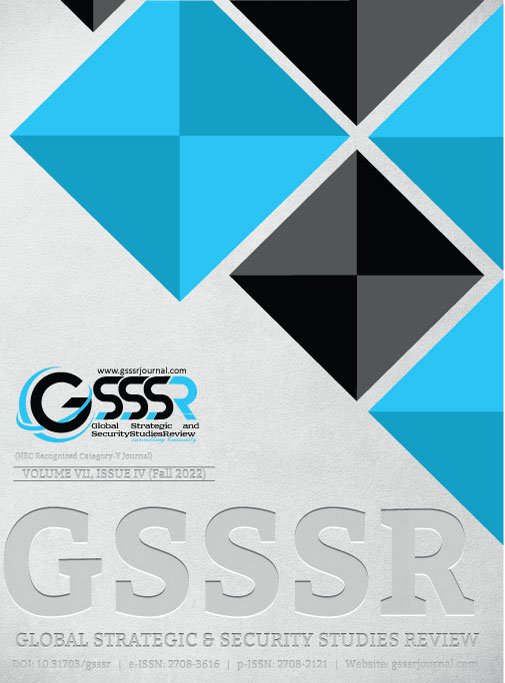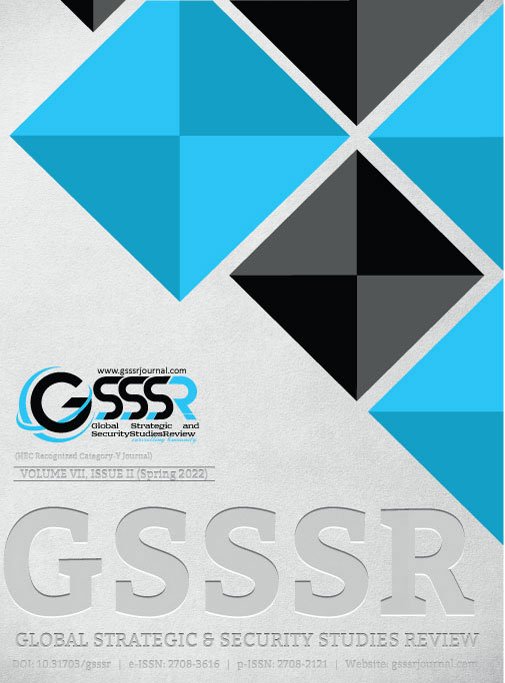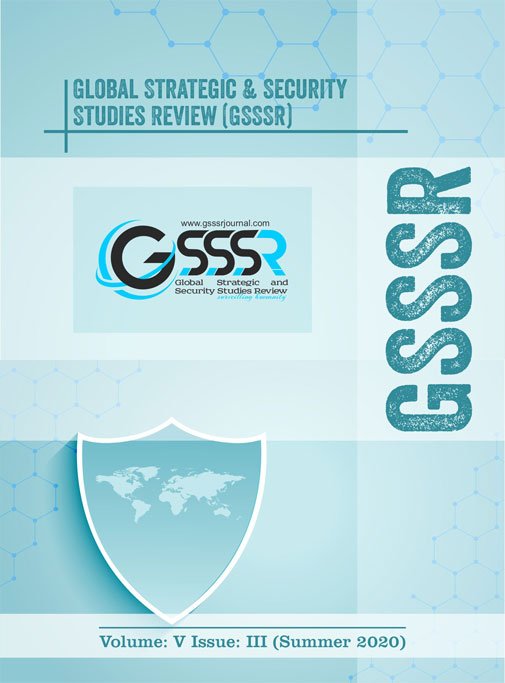01 - Pakistani Private TV News Channels' Coverage to Military Operation 'Zarb-e-Azb':
http://dx.doi.org/10.31703/gsssr.2023(VIII-I).0110.31703/gsssr.2023(VIII-I).01 Published : Mar 2023
-
The military operations have exacted serious effects on the socio-psychological structure of society which has led to an overall tense environment. The aim of this study was to explore the public's perspective on Pakistani private TV news channels' coverage of military operation ‘Zarb-e-Azb’. The research sought to understand the public's consumption habits of this coverage, assess the... Details
-
Military Operation ââ¬ËZarb-e-Azbââ¬â¢, The War on Terror, Pakistani Media, Media Dependency Theory, Private TV News Channels, ISPR (Inter Services Public Relations)
-
(1) Abdul Basit
School of Media and Communication Studies, University of Management and Technology, Lahore, Punjab, Pakistan.
(2) Anjum Zia
School of Media and Communication Studies, University of Management and Technology, Lahore, Punjab, Pakistan
(3) Shazia Ismail Toor
Assistant Professor, School of Communication Studies, University of the Punjab, Lahore, Punjab, Pakistan.
02 - Implications of Drone Strikes on Pakistan during USA War on Terror: An Analysis
http://dx.doi.org/10.31703/gsssr.2023(VIII-I).0210.31703/gsssr.2023(VIII-I).02 Published : Mar 2023
-
USA strategists dwelled strategy of drone strikes to kill terrorists in War on Terror. The effectiveness of drone strikes remained debatable both in defense and academic circles. Some have of the opinion that it paid a lot for USA with minimum collateral damage and it helped US forces in locating and targeting terrorists. While some found this strategy ineffective to achieve any noticeable goals P... Details
-
Implications, Counterterrorism, Extremism, Administration, Strategy
-
(1) Imran Wakil
Assistant Professor, Department of International Relations, Government College University, Faisalabad, Punjab, Pakistan.
(2) Ghulam Mustafa
Associate Professor, Department of International Relations, Government College University Faisalabad, Punjab, Pakistan.
(3) Muhammad Afraz Ansar Khan
M.Phil. Political Science, Department of Political Science, Government College University Faisalabad, Punjab, Pakistan
03 - Sino-Israel Relations in a Second Cold War Perspective
http://dx.doi.org/10.31703/gsssr.2023(VIII-I).0310.31703/gsssr.2023(VIII-I).03 Published : Mar 2023
-
All states' foreign policies during the Cold War were influenced by the conflict between the United States and the Soviet Union. Few nations sided with the USSR, while the vast majority of states in the world supported the United States. The post-Cold War environment has an equal impact on the nature of relations between states. One economic alliance is commanded by the People's Republic of China,... Details
-
Israel, China, Second Cold War, US
-
(1) Tajwar Ali
PhD Scholar, School of History , Zhengzhou University, Henan Province, China.
(2) Haseena Sultan
PhD Scholar, School of History , Zhengzhou University, Henan Province, China.
(3) Aftab Alam
Research Assistant, Department of Political Science, Abdul Wali Khan University, Mardan, KP, Pakistan.
04 - Kargil war as Security Deterioration of South Asia
http://dx.doi.org/10.31703/gsssr.2023(VIII-I).0410.31703/gsssr.2023(VIII-I).04 Published : Mar 2023
-
India and Pakistan are two high risks running in this competitive strategy. Since India and Pakistan appeared as independent States on the World map, South Asian security has been derailing in an unstable and vast shape. Kargil pushes the region towards unease and insecurity. Although India called it a proxy War, which was controlled by Pakistan forces. In Kargil both states showed their presence... Details
-
Deterioration, Security, Region, South Asia, Kargil, India, Pakistan, Dilemma
-
(1) Rabia
Associate Lecturer, Department of Political Science, Government College Women University, Sialkot, Punjab, Pakistan.
(2) Tahira Mumtaz
Lecturer, Department of Political Science, Government College Women University, Sialkot, Punjab, Pakistan.
(3) Muhammad Atif
Assistant Professor, School of Integrated Social Sciences, The University of Lahore, Lahore, Punjab, Pakistan.
05 - Influence of Bioterrorism: Challenges and Prospects
http://dx.doi.org/10.31703/gsssr.2023(VIII-I).0510.31703/gsssr.2023(VIII-I).05 Published : Mar 2023
-
While terrorism is a crime motivated by politics, ideology, or history, bioterrorism is a more sophisticated kind of terrorism that uses biological agents or toxins to harm humans, other organisms, or the environment. Bioterrorism has spread many diseases, including Anthrax, Plague, Tularemia, Smallpox, Dengue Fever, and COVID-19. Whether bioterrorism is a myth or reality, the acceleration of biot... Details
-
Bioterrorism, Covid-19, biowarfare, 5 GW, pandemic
-
(1) Bushra Qamar
Research Scholar, School of Political Science, Minhaj University Lahore, Lahore, Punjab, Pakistan.
(2) Adeel Irfan
Head/Assistant Professor, School of Peace and Counter-Terrorism Studies, Minhaj University Lahore, Lahore, Punjab, Pakistan.
(3) Nasra Siddique
Research Scholar, School of Peace and Counter-Terrorism Studies, Minhaj University Lahore, Lahore, Punjab, Pakistan.
06 - 'Old' And 'New' Consensus Amidst Us-China Economic Rivalry In The Global South
http://dx.doi.org/10.31703/gsssr.2023(VIII-I).0610.31703/gsssr.2023(VIII-I).06 Published : Mar 2023
-
There was less critical thinking on the subject of 'development' until it became popular in the 1950s. The proponents of 'development' in world politics ranged from modernization theorists to supporters of democratic development. Both the proponents used the term modernization, development and progress interchangeably in the context of third-world development. Today, in the development studies, wh... Details
-
Washington Consensus, Beijing Consensus, Global South, Development, Economic Rivalry
-
(1) Maryam Nawaz
MPhil Scholar, Department of International Relations at Kinnaird College for Women, Lahore, Punjab, Pakistan.
(2) Shireen Mushtaq
Assistant Professor, Department of International Relations at Kinnaird College for Women, Lahore, Punjab, Pakistan.
07 - Nuclear Deterrence and Non-proliferation Regime: A Critical Analysis
http://dx.doi.org/10.31703/gsssr.2023(VIII-I).0710.31703/gsssr.2023(VIII-I).07 Published : Mar 2023
-
This research paper critically examines the intricate relationship between nuclear deterrence and the non-proliferation regime, focusing on India and Pakistan as a case study. It analyzes the role of the non-proliferation regime in preventing nuclear weapons proliferation and evaluates the motivations for states to acquire such arms. The paper also explores the concept of nuclear deterrence as a s... Details
-
Nuclear Deterrence, Non-proliferation Regime, Nuclear Proliferation, India, Pakistan, Regional Stability
-
(1) Muhammad Qasim Khan
Executive Director Programs, Centre of Excellence on Countering Violent Extremism, Khyber Pakhtunkhwa, Pakistan.
(2) Amna Munawar Khan
M.Phil. Scholar, Department of Defense and Strategic Studies, Quaid-i- Azam University, Islamabad, Pakistan
(3) Basharat Hussain
Research Fellow, Global Policy & Research Institute, Islamabad, Pakistan.
08 - Space Militarization- A Peace Hoax
http://dx.doi.org/10.31703/gsssr.2023(VIII-I).0810.31703/gsssr.2023(VIII-I).08 Published : Mar 2023
-
States' proficiency to promulgate themselves as the hegemon in this contemporary world had encouraged them to expand their military horizon beyond land, air, and water, to maintain deterrence and dominance. The strategic stability order has been compromised by the consistent accumulation of armed satellites, leading towards space weaponization to secure their national sovereignty and integrity. Th... Details
-
Space Militarization, Space Weaponization, Security Trilemma in South Asia, Space nationalism, International Law
-
(1) Maria Naheed
Ph.D. Scholar, Department of Defence and Strategic Studies, Quaid-e- Azam University, Islamabad, Pakistan.
09 - Governance Crisis In Pakistan: Genesis And Solutions
http://dx.doi.org/10.31703/gsssr.2023(VIII-I).0910.31703/gsssr.2023(VIII-I).09 Published : Mar 2023
-
Good governance performs an inevitable role in the smooth functioning of a state by ameliorating the livelihood standards of its citizens. Unfortunately, since its inception, governance has been a persistent challenge for Pakistan raising the question of whether the nation is inherently ungovernable. The military's intervention in the democratic process, incompetent political leadership, instituti... Details
-
Governance, Political Instability, Transparency
-
(1) Amer Liaquat Chattha
Deputy Director Research, Provincial Assembly of The Punjab, Lahore, Punjab, Pakistan.
10 - State Legitimacy, Governance, and TTP's Enduring Terrorism
http://dx.doi.org/10.31703/gsssr.2023(VIII-I).1010.31703/gsssr.2023(VIII-I).10 Published : Mar 2023
-
There is a divided opinion in the existing scholarship about the role of poor governance including socio-economic marginalization and political grievances and their causal link with the occurrence of terrorism. Some scholars argue that socioeconomic deprivation such as poverty and political exclusion are not related to terrorism, while others argue that they provide an enabling environment where t... Details
-
State legitimacy, Grievances, Tehrik-i-Taliban Pakistan, Terrorism, Pakistan
-
(1) Shahzad Akhtar
Assistant Professor, School of Integrated Social Sciences, University of Lahore, Lahore, Punjab, Pakistan.
11 - Analyzing the Geostrategic Dynamics in Iraq: Saudi-Iranian Rivalry and Pakistan
http://dx.doi.org/10.31703/gsssr.2023(VIII-I).1110.31703/gsssr.2023(VIII-I).11 Published : Mar 2023
-
This research is about explaining Pakistan's proclaimed neutral policy towards the Saudi-Iran rivalry in Iraq. Regarding the Middle East, Pakistan's policy of neutrality has been adopted and claimed by Pakistan after the Iranian Revolution of 1979, which created an environment in the Middle East where Saudi Arabia and Iran emerged as rival forces in the region. While discussing the roots of neutra... Details
-
Saudi Arabia, Iran, Pakistan's Foreign Policy, Neutrality, Iraq War, Rivalry
-
(1) Muhammad Irfan Ali
Assistant Professor, Department of Political Science and International Relations, University of Central Punjab, Lahore, Punjab, Pakistan.
(2) Waheed Ahmad Khan
Associate Professor, Department of Political Science and International Relations, University of Central Punjab, Lahore, Punjab, Pakistan.
(3) Malik Adnan
Associate Professor, Department of Media & Communication Studies, The Islamia University of Bahawalpur, Punjab, Pakistan.

 Volume X, Issue I (Winter 2025)
Volume X, Issue I (Winter 2025)  Volume IX, Issue III (Summer 2024)
Volume IX, Issue III (Summer 2024)  Volume IX, Issue II (Spring 2024)
Volume IX, Issue II (Spring 2024)  Volume IX, Issue I (Winter 2024)
Volume IX, Issue I (Winter 2024)  Volume VIII, Issue IV (Fall 2023)
Volume VIII, Issue IV (Fall 2023)  Volume VIII, Issue III (Summer 2023)
Volume VIII, Issue III (Summer 2023)  Volume VIII, Issue II (Spring 2023)
Volume VIII, Issue II (Spring 2023)  Volume VIII, Issue I (Winter 2023)
Volume VIII, Issue I (Winter 2023)  Volume VII, Issue IV (Fall 2022)
Volume VII, Issue IV (Fall 2022)  Volume VII, Issue III (Summer 2022)
Volume VII, Issue III (Summer 2022)  Volume VII, Issue II (Spring 2022)
Volume VII, Issue II (Spring 2022)  Volume VII, Issue I (Winter 2022)
Volume VII, Issue I (Winter 2022)  Volume VI, Issue IV (Fall 2021)
Volume VI, Issue IV (Fall 2021)  Volume VI, Issue III (Summer 2021)
Volume VI, Issue III (Summer 2021)  Volume VI, Issue II (Spring 2021)
Volume VI, Issue II (Spring 2021)  Volume VI, Issue I (Winter 2021)
Volume VI, Issue I (Winter 2021)  Volume V, Issue IV (Fall 2020)
Volume V, Issue IV (Fall 2020)  Volume V, Issue III (Summer 2020)
Volume V, Issue III (Summer 2020)  Volume V, Issue II (Spring 2020)
Volume V, Issue II (Spring 2020)  Volume V, Issue I (Winter 2020)
Volume V, Issue I (Winter 2020)  Volume IV, Issue I (Fall 2019)
Volume IV, Issue I (Fall 2019)  Volume III, Issue I (Fall 2018)
Volume III, Issue I (Fall 2018)  Volume II, Issue I (Fall 2017)
Volume II, Issue I (Fall 2017)  Volume I, Issue I (Fall 2016)
Volume I, Issue I (Fall 2016)